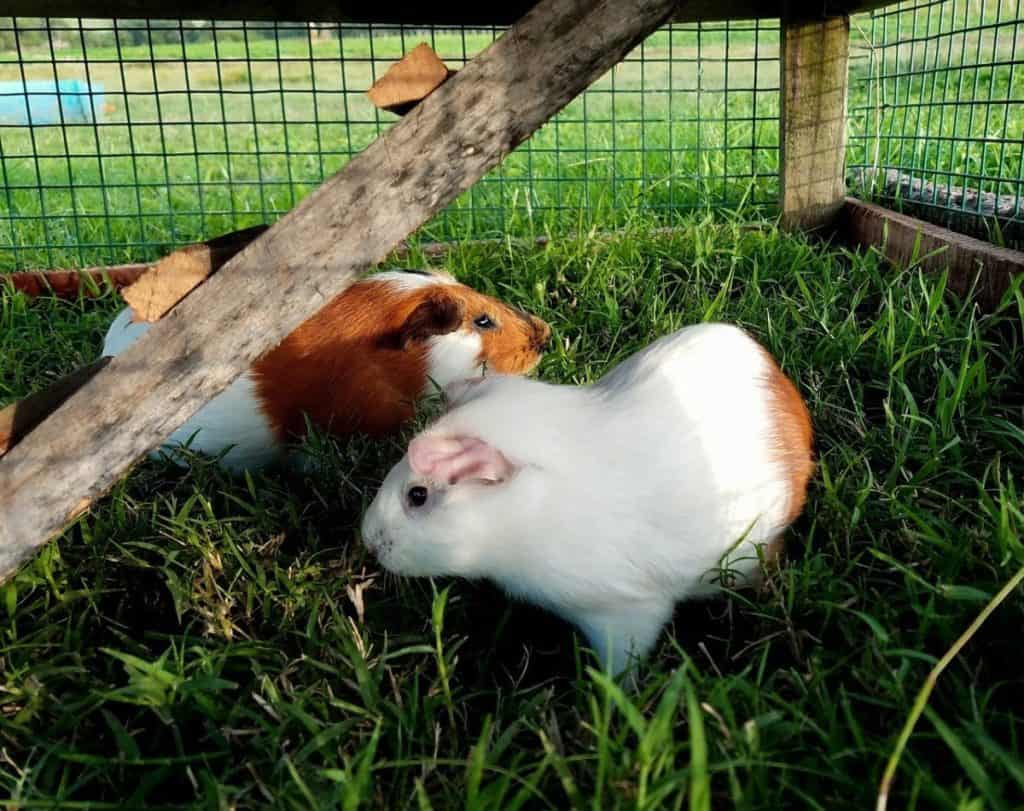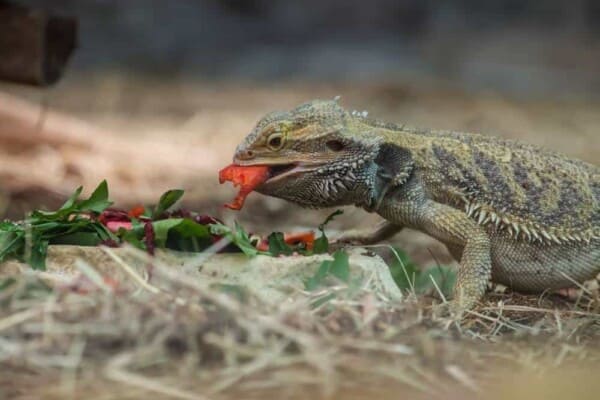Not every location has an ideal temperature for your guinea pig based on where you live. Some places will have conditions that can be either too hot or too cold for a guinea pig to survive outside. This guide will provide all the answers about keeping your guinea pig outside.
So can guinea pigs live outdoor? Yes, they can if they are kept warm in poor winter weather and sheltered from scorching heat in summer. An alternative option is to keep your guinea pigs in a hot outhouse all year long. You should never let your guinea pigs outdoor in poor weather.
Can guinea pigs live outside?
Yes, guinea pigs can be kept outside if the conditions are right, However, there are some dangers that are posed by guinea pigs living outdoors. Let’s talk about 6 of these dangers and how to make sure that your guinea pigs are comfortable and safe when kept outside.
1. Extreme temperatures
Bringing your guinea pig outside is all going to depend on the weather. They don’t like the weather if it’s too hot or too cold. The ideal temperature needs to be between 72-78 degrees which is essentially room temperature.
You might feel that a moderately sunny day is fine for your guinea pig, but there can be hidden dangers. If the humidity is too high, they can actually get heatstroke from the sun. This just goes to show you that it’s not just temperature that can be harmful to your guinea pigs.
2. Predators
There are lots of animals that are going to view your guinea pigs as easy prey. Depending on where you live there can be predators like hawks, eagles, coyotes, and even wild cats and dogs. All these can become a threat to your guinea pigs if they are left alone.
3. Stress and illnesses
Guinea pigs are fragile little critters that are often prone to getting sick because of stress or loud noises. Being outside in an environment they are not used to could trigger illnesses. It can also come from being poisoned by items available outdoor they are not used to eating.
4. Parasites: fleas & ticks
Your cavy will be exposed to all sorts of pests that could find their way onto its fur. Fleas and ticks will be a big concern and they will need to be removed as soon as possible. Mosquitoes and flies might carry illnesses onto your guinea pigs and make them sick too.
5. Poisonous plants and flowers
You might not realize that your backyard and garden can have flowers and plants that are toxic and poisonous so it’s a bad idea to feed these items from your garden to your guinea pig. Knowing what they can eat is a matter of life and death for most modern cavies.
6. Toxins and pesticides in your grass
The kind of products you put on your lawn and garden can be very toxic to a guinea pig. Even environmentally friendly pesticides and additives could be harmful to cavies as they are so fragile. If they are outside, they should only go where these additives are not being used.
What kind of setup should guinea pigs have outdoors?

Just like when you set up your guinea pig cage indoor, you will need to think about a proper cage setup when they stay outside for a while. There are 3 main things you need to consider when setting up a temporary outdoor habitat for your guinea pigs.
1. Hutch
A hutch should have good coverage that can be adjusted to get airflow. It also needs to be covered so that predators cannot get inside to harm your guinea pigs. It should also be guinea pig-proof so they can’t escape since many outdoor hutches have spaces they might crawl through.
You only live guinea pigs in a hutch all year round if it’s a well-insulated hutch and if you live in an area that has moderate weather. Hutches are designed to have airflow but it will all depend on how good the weather is holding up.
2. Food
Aside from straw and grass that they eat all throughout the day, they will need enough food at scheduled times. They also need enough water they can drink depending on the number of guinea pigs. Remove any leftover food that they don’t eat so there is no chance it could start rotting and cause bacteria problems.
Adding hay and straw inside the hutch is not recommended unless it’s added as food. While this material is fine for rabbits, it can be a breeding ground for bacteria.
3. Fleece
This is the best bedding material that should be on the floor of an outdoor hutch. Adding pee pads that are used for puppy training is a good idea. These pads go underneath fleece blankets and help absorb urine that could cause your guinea pigs to have footpad problems like bumblefoot.
What type of conditions do guinea pigs live in in the wild?
Since guinea pigs have been taken out of their natural habitat, you don’t find guinea pigs living in the wild anymore. They have been bred to live indoors for the most part and have lost their ability to survive in the wild. The type of weather they used to experience was warm South American climates. Locations including Columbia, Peru, Ecuador, and Bolivia all have temperatures ranging from 62-80 degrees Fahrenheit.
They lived on grassy slopes and meadows inside dens that were dug into the ground. If the weather was not ideal for them, they would spend most of their day in their den. When it was safe for them to come out, they would forage for grass, roots, and natural vegetation within these regions.
Can I leave my guinea pigs outside all year round?
As temperatures vary from state to state you will likely encounter either hot summers or cold winters. Chances are, your guinea pig will not like either of these extremes unless the weather where you live is extremely moderate. So unless you have a mild climate that remains 62-80 degrees Fahrenheit all year long, it will be hard to find a middle ground.
Can guinea pigs live in the garage, basement, or attic?
We would not recommend putting a guinea pig in a garage since the temperature and noise won’t be so easy to control. The same applies to an attic since heat rises and this will be uncomfortable during the day or too cold at night.
The best place to keep your guinea pig is in a basement because it is going to be a nice and quiet place that is also temperature-neutral.
Can you leave a guinea pig outdoors overnight?
If it happens to be good weather and a quiet area with very little sound, they can be left outside for the night. Guinea pigs in rural areas should be well-protected from predators that might try to get to them. Guinea pigs are not nocturnal animals and if they hear any noises from these predator animals, they will sound off warning noises making them even more of a target.
Also, keep in mind that predators like foxes and wild dogs are able to dig deep to get their prey, so you might need to bury your hatch halfway to prevent any accidents. If predator encounters are likely, you need to ask yourself if keeping your guinea pigs outdoors is worth the risk.
Can you leave guinea pigs outdoors in the winter when it snows?
You should never keep guinea pigs outdoor when it snows, even if they are inside a covered hutch. They are not the kind of animals that can survive these kinds of extreme temperatures. No matter how warm you keep an outdoor hutch, it’s considered animal cruelty if you don’t bring them indoors.
Can a guinea pig get a cold?
Guinea pigs do get colds that are caused by respiratory infections. These infections can come from contact with other cavies, the wrong type of cage bedding, or simply stress. A cold can quickly turn into pneumonia and ultimately endanger the life of your guinea pig.
The average guinea pig temperature ranges from 99-104 Fahrenheit. The reason why you might see guinea pigs snuggling or sleeping with each other might be that they are cold. If they get too hot they will search for a cooler area in their cage or hutch.
What temperature is too hot or too cold for a guinea pig?
Even though guinea pigs come from South America where temperatures can soar in the upper 80s in the summer, they would hide in their burrow. So anything higher than 80 degrees Fahrenheit is too hot for your guinea pig. Anything colder than 62 degrees Fahrenheit will be too cold for them.
Will several guinea pigs keep themselves warm outside?
Typically, guinea pigs will group together to keep warm but not all the time. They huddle for short periods until they get too hot or want to graze in their area. Since they don’t sleep so often (perhaps 30 minutes at a time), the rest of the time is zooming around chasing each other.
Related articles:
- How much do guinea pigs cost? A complete cost breakdown
- Guinea Pig grooming tips – How to groom a guinea pig like a pro
References and further reading:
- Guinea Pigs, Shannon M. Riggs
Contents
- Can guinea pigs live outside?
- What kind of setup should guinea pigs have outdoors?
- Can I leave my guinea pigs outside all year round?
- Can guinea pigs live in the garage, basement, or attic?
- Can you leave a guinea pig outdoors overnight?
- Can you leave guinea pigs outdoors in the winter when it snows?
- Can a guinea pig get a cold?
- What temperature is too hot or too cold for a guinea pig?
- Will several guinea pigs keep themselves warm outside?













